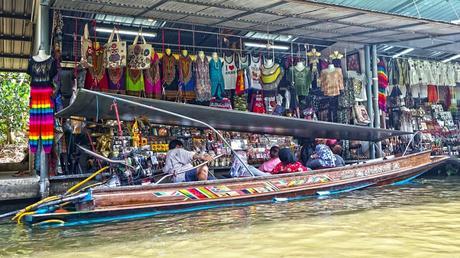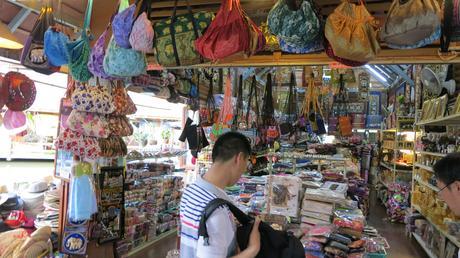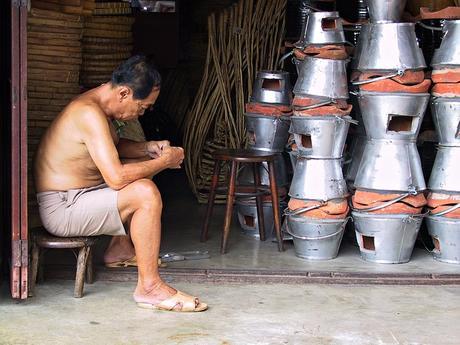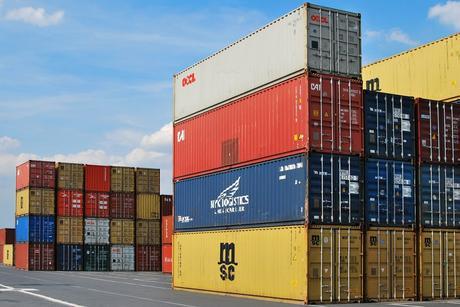This is a guest post by Seb Scala, a Bangkok expat who’s been exporting products from Thailand for several years.
There’s a little joke you hear quite a bit when living in Thailand:
How do I make a small fortune in Thailand?
Answer:
Start out with a big one!
Stories abound of people moving to Thailand with hopes and dreams of starting a new life. They have some money saved up, some idea of what they want to do and a whole suitcase full of enthusiasm.Time wears on, often a less than ideal relationship becomes involved, and things start to turn sour very quickly.
Invariably this ends up in a tale of tragedy that would make Sophocles proud.
Is this always the case?
No.
Something I’ve learned in my years in Thailand export is that those people who have great relationships, a good business and live a generally happy and fulfilling life keep it pretty much to themselves.
Their challenges, tough though they may be, are accepted as part of the journey and taken on the chin.
Those who shout the loudest are the ones who play the victim card.
You put all your money into something without testing the waters first? You didn’t bother to get contracts in place, and your partner (who you just met) ripped you off? You met your Thai girlfriend in a go go bar, and it turned out she isn’t a faithful and doting housewife?
สมน้ำหน้า!
(Som Nam Na – serves you right!)
Rule number #1 – Don’t be a victim.
This isn’t Disneyland, despite what your friends might have told you. If you make a stupid decision and it goes wrong, that’s on you. Man (or woman, I’m not biased!) up, learn your lesson and move on.
A little about me
I first moved to Bangkok on holiday with a friend and it was my first time out of Europe.
Wow.
Having always dreamed of traveling, I was utterly intoxicated by the sights, sounds and smells of a culture so different to my own. Over the next couple of years, I came over a couple more times, culminating in a month’s holiday the last time I visited as a Tourist.
That was August 2008. While I was in Bangkok having fun, the economic World was collapsing around me. Doom and gloom filled every media outlet; “the ship’s sinking and there aren’t enough lifeboats”.
BE AFRAID!
But I realized; I wasn’t afraid of the impending economic doom.
It dawned on me that what scared me most was waking up in 40 years and walking into the same London office, with the same people, doing the same boring job.
So the day after I landed back in London, I walked into my cushy, overpaid, recession-proof Government job and quit, in the darkest days of the worst recession of my generation.
Six months later I arrived in Thailand with enough money for three months, an idea and a dream.
Best thing I’ve ever done!
Rule #2 – don’t let the fear stop you.
If you leave your own country to try and start a business in another one then it can be scary, there’s a good chance it won’t go to plan, and there’re a million things that can go wrong. Ask yourself; is trying and potentially failing worse than just continuing to live a life of mediocrity?
Why did I get into exporting in Thailand?
On my previous trips to Thailand, I had noticed some products that I thought I could sell for a markup back in the UK. Upon my return to the UK I tried, successfully, to sell them to my friends and family. It worked well. The problem was that dealing with a Thai supplier by email from the UK is pretty much the perfect recipe for disaster.
Late orders, entirely incorrect orders, sudden disappearances for weeks at a time after deadlines had passed, lost shipments…you name it, I dealt with it. I figured I’d proven there was a market for the product if only I could find a supplier who could give me a European service standard at Thai prices.

Hang on a minute – I could be that guy!
How to chose your product to export out of Thailand
There are a million ways to make money in Thailand but to me, physical products were always the simplest to understand.
Having been a wheeler-dealer all my life, I knew how to buy low and sell high.
The thing is, it’s very easy to sell something in theory.
To think that people want a product because it seems popular, you can get it for a good price, and, well, you like it, so everyone else probably should.

The next step is often to build a whole business around it – investing in and perfecting every element before you open your doors so that you can cope with the expected rush of orders…
…only to find out once you launch that nobody cares.
It doesn’t have to be done this way.
Rule #3 – make sure people will buy your product before investing any money
Recently I wanted to launch a new product.
Everything seemed great on paper – I found plenty of people online selling it at a price I knew I could make a high margin on. Manufacturing would be simple and quick.
A fortune was just waiting to be made!
Instead of making a new website, buying stock, getting the machines and hiring the new staff, I wanted to see if anyone would actually buy it first.
So I knocked up a few Photoshop images of the product and threw them up on a newly opened Etsy shop for sale at my target price.
Quick, simple and free.
Next, I contacted a few people through the Etsy messaging system that had bought a similar product and told them I would give them a discount if they could answer a few questions.
(note – I got an angry email from Etsy about this being against their policy but who cares? It was only a test shop anyway and they didn’t even close it!).
At the same time, I messaged the link to the shop to some Facebook friends who I thought might like it. I told them that I had found this awesome product, and there was only 2 left, so if they wanted it to buy it asap.
What was the outcome of all this?
I quickly, and for free, found out that the product was a hot niche product 2 years ago, and it was on its way out of fashion. Nobody would be buying it six months from now.
Needless to say, nobody bought anything in my shop, although one girl did ask after I’d taken it down when we would be ready to ship.
If someone had actually bought a product, I had a choice between either making it and sending it to them or apologizing and making some excuse and sending their money back.
That’s not the important part.
What is important is that it would have told me if people will buy it or not.
The problem with surveys and focus groups is people will agree that they like almost anything in theory. If they get out their wallet or not, that’s a whole different ballgame.
The key to finding a product you can sell at a profit is to look around at items that interest you.
When you see one that you know you have seen the exact same thing (not a higher quality version of a similar thing!) selling in your country for a much higher price than you can buy them here, you could be on to a winner.
Some examples to start off with:
- Handmade wooden goods
- Shoes
- Traditional ornaments
- Leather goods
- Thai Handicrafts

Once you’ve found a product people will pay for, you’re going to need to find it at a price you can work with. Bobae Market in Bangkok is a good place to visit, along with MBK.
How to find good Thai suppliers
If you’re on your own and looking for a product, you’re most likely to start out buying from a trader in a tourist area. You’re certainly not going to walk straight into a big factory!
Although these days, with Directories like Alibaba and the like, it can be easier to find big factories, they generally won’t respond to any communication in English (or Thai, for that matter).

Getting back to the factory level in a supply chain in any meaningful way is like getting a membership to a private member’s club. It’s not impossible, but you need to know the right people who will tell the key people that they vouch for you.
This takes some time. The thing is, most small time traders who will sell products to you from a market stall or small shop operate on tiny margins.
Often they will speak enough English to get by, be willing to offer you discounts the more you buy, even deliver to you for free and will be a great help in the beginning.
Let them have their margin for a while, it’s worth them taking care of the headache for you. Over time, if your business grows, people will notice. You might suddenly start getting phone calls out of the blue, or people walking up to you offering you better prices.
This is how, bit by bit, I got right back to the raw material importers and factories that produced the goods.
Just be patient and concentrate on your sales and getting the product right, and the rest will come.
How to negotiate costs
These days things are quite different for me compared to how they once were. I’m somewhat established here, suppliers know who I am and that I’ve been working directly with big factories for several years.
My knowledge of how to treat people and how things work help me get treated more like a local. When you are “fresh off the boat”, you don’t have any of these advantages. You can be in for a rough ride if you go into any type of negotiation with the same mentality that you would in your own country.
Rule #4 – When it comes to negotiating in Thailand, there’s no such thing as “playing hardball”.
I have seen people fall at this stage so many times. It isn’t easy to get your head around, believe me. I didn’t become adept at it overnight. In the UK, if I want a product I look around for people selling it, and then I play them against each other. They all want my business, I’m the one with the money to give, I’m going to see who will bend the furthest to get it.
If you want my business, you’re going to need to play ball. If you come to a negotiation in Thailand with this attitude, you’d better get ready to lose.
This is how it would go:
You:
I want to buy product X from you. I can guarantee you Y orders a month.
Seller:
Ok, the price is *taps on calculator*.
You:
No chance! Are you trying to scam me?! I can buy it down the street for WAY cheaper!
Seller:
Ok good for you, you go then.
You struck out there buddy. Time to move on.
The gentle art of negotiation
Rule #5 – keep your cool and be patient, good things come to those that wait.
I’m not talking about the small-time vendors selling knock-off watches in high traffic tourist areas.
You can scream abuse at them, and they’ll still run after you offering a discount. Often they are foreign labor on commission and have steep targets to make enough money to survive, so they don’t take it personally.
If you’re trying to start a long term relationship with a Thai trader though, you’d better play by the rules.
This applies more and more the further away you get from the street level trader who is used to dealing with foreign tourists to the factories and importers who are very selective who they deal with.
In Thailand, nothing matters more than “face”.
It means it doesn’t matter how something really is. It ONLY matters how it is perceived. The most important thing in a negotiation is that everyone is seen to win, even if that quite obviously isn’t the case.
Even if nobody else is watching.
A successful negotiation is a dance, which may take quite some time to complete. You won’t always (or even usually) be able to get a resolution the same day.
An example that happened to me:
You:
I want to buy product X from you. I can guarantee you Y orders a month.
Seller: “
Ok, price is *taps on calculator*.
You: “
Hmm. I can see that price is fair for the quality of your product, but I just can’t pay that much. I really wish I could *sad face*, I would love to work with you. It’s just that my customers don’t pay me enough, I’m sorry.
Seller:
How much can you pay?
You:
Really the most I can pay is X and that’s only if the product is great quality and turnaround time is quick, so I can accept very small profit.
(of course, the small profit part isn’t true!)
Seller:
Oh, I cannot sell at X.
You:
I understand. I really wish you could, I love your product. Oh well, I’ll have to keep looking for somewhere who can sell it at a price that I can afford…
Seller:
I never sold at that price before. I have to check with my wife.
They don’t mean check now. They mean you should go away, and they’ll pretend to talk to whoever it is and that person will “allow” them to accept your price.
That way, you won, but they didn’t lose face. Their “wife” made them do it. Wait for the phone call or call them back in a couple of days.The best relationships I have with suppliers started out with this dance that sometimes went on for weeks.
Often I’ve been able to go back and “dance” with them all over again to get a further discount, to the stage where I know I’m getting a better deal on some products than some big local players.

How have I been able to do that?
Rule #6 – your word is all you have, always stick to it.
In Thailand, just like anywhere else, there are a whole lot of people that, to put it frankly, are full of crap.
They’ve done this; they can offer that, they’ll make you the richest man on Earth.
How often do you think your suppliers have heard the same old story?
Be different.
If you agree a price, pay it.
If you agree a payment day, pay on that day.
If you say you’ll order 100 a month, order 101.
Over time, your relationship can develop, and their trust that you’re an excellent customer grows to the point where they’re willing to “dance” again to keep you happy.
Some of the best info and leads I get on new products and opportunities come from my suppliers, who want me to get more business so that I can in turn give more to them.
Make sure you can make an acceptable margin at the beginning and play the long game with your suppliers, so your margin keeps expanding over time.
How to ship your goods out of Thailand
If your goods never reach your customer, you won’t be in business long.
Rule #7 – choose your shipping method carefully
If you want to export a product from Thailand as a foreigner, you will need a Thai Limited company, a minimum number of Thai employees, a work permit, a company office, a certified accountant, etc.
None of this comes cheap.

When I ship my goods, my company prepares pro forma invoices for the clients with the genuine value of the goods. We book a shipment with a major logistics company using our company account, and they ship the goods to the client and deal with the customs clearance.
Now, I want to make it clear, I would never suggest that you do anything outside of the letter of the law. (Find out more about setting up a Thai business here and here.)
I can say, however, that I have heard of people that make a good living just buying products in Thailand with cash and using Fedex, DHL, etc., which have offices all over Thailand, to ship their goods to wherever they want.
These big companies don’t seem to care how/why you’re sending the boxes as long as the goods themselves aren’t either fake (i.e. branded copies) or dangerous.
Using registered services from the Thai Post office is another option which can be cheaper and is generally reliable, although they have been known to finger foreigners sending an unusually large number of parcels over time without a company.
Take that how you wish.
How to sell your goods
Once you have your product, your suppliers and your logistics in hand, you’re still missing one key element.
The customers.
How to find customers?
If I could summarize the perfect way to find customers in one article, it would be a miracle. So much depends on the product, the market, the demographic, the price point, etc.
I don’t like selling to individual customers, personally. It comes with elements that I don’t want to deal with:
Customer service, after sales service, marketing… No thanks.
For that reason I use services like Alibaba (who, despite their $5000 a year price tag will quite quickly reduce it to $500 if you keep pushing) to advertise to companies that wish to import my product and sell to their clients.
This works perfectly for me. I accept a lower margin, but I only have to deal with one person per account instead of hundreds.
It means that I only need a few great clients to sell a lot of products.
I know other people who make a good living using direct to consumer methods like:
- Ebay (less and less these days)
- Etsy
- Their own website
These methods all require that you are either already well known in your niche, or that you can become well known quickly.
As for how to do that? That’s a whole other industry that I won’t get into here.
What’s the most important thing I’ve learned?
Reading this article, you wouldn’t be blamed for thinking I have it all worked out, and I have had a pretty smooth ride of it.
Nothing can be further from the truth. But, as I indicated at the beginning, I won’t play the victim card.
I’ve worked extended periods of time for 18+ hours a day, I’ve been so broke I can’t even afford a hot dog from 7/11, I’ve been screwed over, stepped on and treated like an idiot.
I’ve sat in bed at 3 am wondering how I’m ever going to turn this thing around.
I’ve also had some of the best times of my life.
I’ve learned lessons, met people and experienced things I would never have done stuck in a cubicle in London.
I wouldn’t trade any of it.
So what’s the biggest lesson I’ve learned that I can give to you?
Rule #8 – no matter how hard it seems right now, don’t give up.
If you’re going to going to try to start an export business in Thailand or Asia from scratch with a view of making it a successful, long-term business (not just a bit of pocket money to fund the next adventure); expect tough times, seemingly insurmountable challenges and frustrations.
Expect to get knocked down and to have to make the decision – do I have the fight left in me to get back up?
Because, if you do, you might just end up with the life that you’ve always dreamed of.
